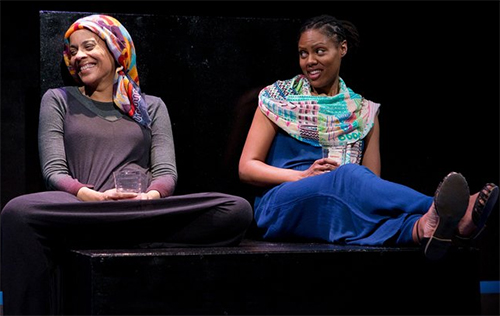Translate Page

---
Brooklyn-based playwright and performer Oni Faida Lampley always used her personal life for inspiration. So when she was diagnosed with breast cancer at age 37 in 1996 (in the midst of nursing her infant child and on the cusp of her first significant movie role in Lone Star), it was almost inevitable that she would write about it.
But the resulting play isn't a disease-of-the-week drama. Instead, Tough Titty is a rich and poignant exploration of race, religion, marriage, motherhood, morality, and mortality as seen through the eyes of Angela, a fierce and funny African-American woman.
And now local audiences finally have a chance to see the semi-autobiographical show, which is receiving its New York City premiere at Paradise Factory on the Lower East Side.
Sadly, Lampley can't participate in the production, since she lost her cancer battle in 2008. However, Lampley's longtime friend, actress Ami Brabson, and Brabson's husband, two-time Emmy winner Andre Braugher, are coproducing Tough Titty as a vehicle for Brabson herself, who participated in early readings of the play in the 2000s as it was being developed.
"Oni and I went to the NYU Graduate Acting Program together, but she was a year ahead of me," Brabson recalls. "We really became friends outside of school when we were cast in The Goddess Project [at Olympia Dukakis' defunct Whole Theater Company in Montclair, New Jersey]. We were in an adaptation of an ancient myth about a goddess who descends into the underworld and comes out reborn. That's kind of like what Oni is talking about in this play: In life, you're constantly going down and rising back up as a different person, but you know that one day you won't come back up at all."
While Brabson never totally abandoned her acting career, it did take a backseat as she focused on raising her three sons with Braugher. But a few years ago she had an epiphany. "I realized that if I was going to continue performing, I had to create opportunities for myself," she says. "And my very next thought was, oh, I should do Tough Titty because it's a play I have loved for a long time. Actresses my age don't often get a role like Angela. It's the kind of part you can really sink your teeth into and demands that you extend yourself further than you thought you could."
Initially Brabson envisioned a workshop, but she and her husband soon found themselves producing a full-fledged showcase. The cast even includes two actors from the play's original 2005 production at Williamstown Theatre Festival: Christine Toy Johnson and Antoinette LaVecchia, who both play multiple roles of various ethnicities. That type of fluidity is employed throughout the show as characters and themes weave in and out of the episodic narrative, which opens with Angela's fourth grade confession to God about wanting time off from being good, and ends with an emotional monologue about the rhythm of sinking and resurfacing that becomes your life when you're fighting a terminal illness.
Although there are many fraught moments in hospitals and doctors' offices, the scenes between Angela and her aloof husband Shaka (Victor Williams) are particularly intense, especially the night before her first surgery. Both characters are desperate for intimacy, but while Shaka wants sex, Angela is seeking a different kind of comfort. "A big part of this play is exploring what it means to be good girl," says Brabson. "Angela has to learn how to stand up for herself and ask for what she wants. That scene is about that. She has trouble saying, 'I don't want sex; I just want you to hold me.' By the time she gets to the end of the play, she can finally demand what she needs, and it's liberating."
Tough Titty has been a bittersweet and cathartic experience for Brabson, who says Lampley was like "a big sister" to her. "The entire cast knew Oni except for Victor, and that was always part of my plan," she says. "I wanted to get actors who were her friends because I believed that would make a difference. We have this feeling of wanting to do right by her and her work. I do wish she were here---having her actual voice to guide us through the play would be amazing."
Brabson is particularly anxious to hear the reactions of Lampley's husband, children, and mother, who are all scheduled to see the show. "It will be interesting to see how they feel, especially because she's gone," she says. "I hope they're going to be pleased, even if it hurts."
---
Raven Snook writes about theatre for Time Out New York and has contributed arts and entertainment articles to The Village Voice, the New York Post, TV Guide, and others.
Photo by Hunter Canning